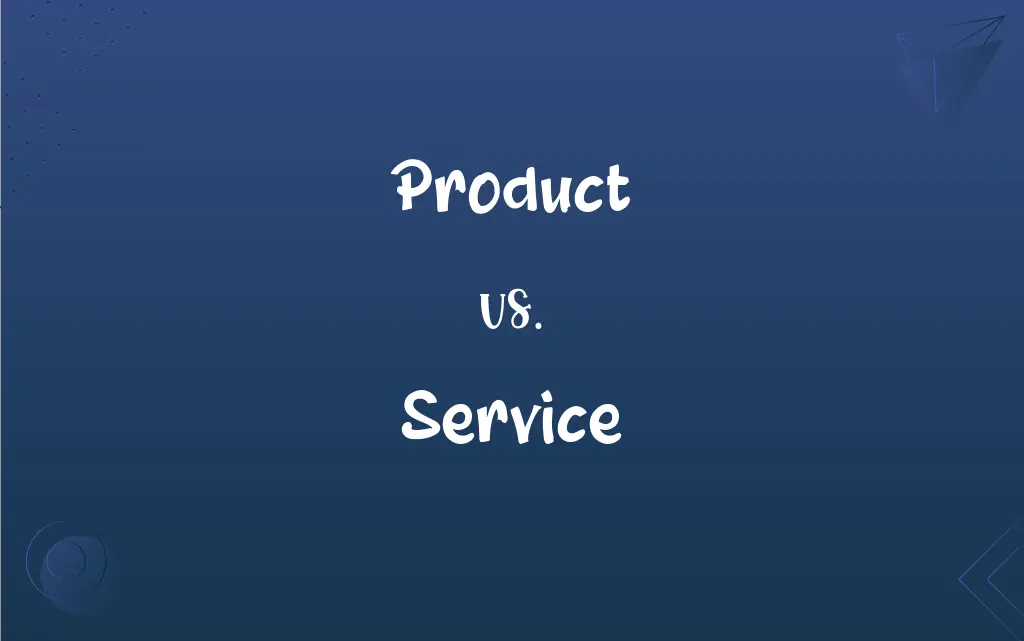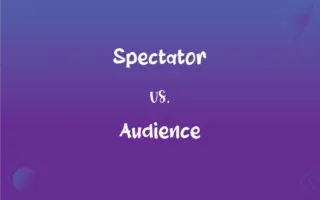Product vs. Service: What's the Difference?
Edited by Janet White || By Harlon Moss || Updated on November 21, 2023
A product is a tangible item that's manufactured and sold, while a service is an intangible action or activity performed for a consumer.

Key Differences
A product refers to any physical item or good that a company produces to be sold to consumers. These are typically tangible objects that individuals can touch, feel, and own. On the other hand, a service is intangible; it's an action or a series of actions performed to benefit someone else. Services are experienced rather than possessed.
The durability differentiates products and services. Products have a longer shelf life and can be stored for future use. For instance, a car or a computer can be used multiple times after purchase. Services, however, are perishable and are consumed at the point of delivery, like a massage session or a flight journey.
Transactions for products often involve a one-time exchange where the customer receives ownership of the item. In contrast, service transactions involve an ongoing relationship between the provider and the client. For instance, while buying a phone (product) is a singular event, phone network coverage (service) requires consistent performance.
The way products and services are evaluated by customers also differs. Customers can often assess a product before purchasing, looking at its features, quality, and aesthetics. Services, however, are assessed mainly based on the outcome and the experience during the service delivery, like the expertise of a consultant or the ambiance of a restaurant.
Despite their differences, products and services are often intertwined. Many businesses offer both, enhancing the value of a product with supplementary services. For example, a car (product) may come with free maintenance checks (service) for a limited period.
ADVERTISEMENT
Comparison Chart
Nature
Tangible
Intangible
Durability
Long-lasting, can be stored
Perishable, consumed at point of delivery
Transaction Type
Often one-time exchange
Ongoing relationship
Evaluation by Customers
Based on features, quality, aesthetics
Based on outcome and experience during delivery
Ownership
Transferred to the customer
No transfer of ownership; experience-based
ADVERTISEMENT
Product and Service Definitions
Product
An artifact manufactured for sale.
The local crafts fair showcased an array of handmade products.
Service
The occupation of aiding or working for others.
She dedicated her life to public service, working tirelessly for community development.
Product
A tangible item produced for consumer use.
The new smartphone is a highly sought-after product in the market.
Service
A ceremony or ritual in religious worship.
The Sunday morning service at the cathedral was deeply moving.
Product
An outcome resulting from a process or operation.
The research team was thrilled with the product of their long hours of experimentation.
Service
An intangible action performed to benefit someone.
The hotel offered impeccable service, ensuring every guest felt at home.
Product
An entity marketed for public consumption.
The latest beauty product promises youthful skin with regular use.
Service
The act of maintaining or repairing something.
My car is due for a service next week.
Product
The total of multiplication sums.
The product of 5 and 4 is 20.
Service
The performance of duties for a superior or employer.
His years of service to the company were recognized with a grand farewell.
Product
An item that is made or refined and marketed
Farm products.
Soaps, detergents, and similar products.
Travel products such as vacation trips.
Service
Work that is done for others as an occupation or business
Has done service for us as a consultant.
Product
Such items considered as a group
Sold a lot of product in May.
FAQs
Are services always intangible?
Primarily, services are intangible, but they can have tangible elements, like a physical report after consultancy.
Can services be stored for future use?
No, services are perishable and are consumed at the point of delivery.
Can a business offer both products and services?
Yes, many businesses offer products complemented by related services.
How can customers evaluate a product before buying?
Customers can assess a product's features, quality, and aesthetics.
Can products and services be bundled together?
Yes, often a product is sold with supplementary services, enhancing its overall value.
Are services repeatable?
While the delivery process can be standardized, each service experience can vary due to its intangible nature.
Is a restaurant meal a product or service?
It combines both; the food is a product, while the dining experience is a service.
Can a service be returned like a product?
Not usually, since services are consumed upon delivery, but dissatisfaction may lead to compensation or redoing the service.
Are services always paid for?
Not always. Some services, like community help or certain online platforms, may be free.
Is a product always tangible?
Typically, products are tangible, but in some contexts, they can refer to intangible outcomes.
Why do some products come with warranties?
Warranties act as a promise of quality and offer service or replacement if the product fails.
Do customers gain ownership of a service?
No, services are experienced, not owned.
Can digital items be considered products?
Yes, digital items like software or e-books are intangible products.
What determines the quality of a service?
Quality is determined by the outcome and the experience during service delivery.
How do businesses promote intangible products or services?
Through showcasing benefits, testimonials, and offering trials or demos.
Can services have warranties?
Some services come with guarantees, promising satisfaction or offering a redo.
Why do some businesses shift from product-based to service-based models?
Services can offer recurring revenue, build customer relationships, and provide value through expertise.
How do businesses price products?
Pricing considers costs, competition, perceived value, and market demand.
Can a service be patented?
While methods or processes can be patented, general services typically aren't.
What's an example of a product enhancing a service?
A high-quality treadmill (product) in a gym can enhance the gym's fitness service.
About Author
Written by
Harlon MossHarlon is a seasoned quality moderator and accomplished content writer for Difference Wiki. An alumnus of the prestigious University of California, he earned his degree in Computer Science. Leveraging his academic background, Harlon brings a meticulous and informed perspective to his work, ensuring content accuracy and excellence.
Edited by
Janet WhiteJanet White has been an esteemed writer and blogger for Difference Wiki. Holding a Master's degree in Science and Medical Journalism from the prestigious Boston University, she has consistently demonstrated her expertise and passion for her field. When she's not immersed in her work, Janet relishes her time exercising, delving into a good book, and cherishing moments with friends and family.






































































